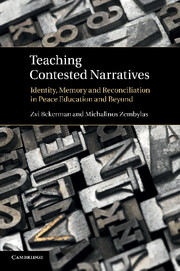Book contents
- Frontmatter
- Contents
- Acknowledgments
- Permissions
- Part I Introduction and theoretical underpinnings
- Part II Living and teaching contested narratives
- Part III Mourning, forgiveness and reconciliation
- Part IV Conclusions
- 11 Becoming critical design experts in schools
- 12 Memory and forgetting
- 13 De-essentializing identity
- 14 Designing different paths for reconciliation pedagogies
- References
- Index
12 - Memory and forgetting
A pedagogy of dangerous memories
Published online by Cambridge University Press: 05 December 2011
- Frontmatter
- Contents
- Acknowledgments
- Permissions
- Part I Introduction and theoretical underpinnings
- Part II Living and teaching contested narratives
- Part III Mourning, forgiveness and reconciliation
- Part IV Conclusions
- 11 Becoming critical design experts in schools
- 12 Memory and forgetting
- 13 De-essentializing identity
- 14 Designing different paths for reconciliation pedagogies
- References
- Index
Summary
It is difficult to assert how much (if at all) history and memory are needed. Too much seems to paralyze us; too little seems to disconcert us (Borges, 1996; Sacks, 1985). Even when one is convinced that the main reason for existing conflicts among individuals and nations has more to do with the distribution of resources than with any psychological concerns, we need to recall that resources come in plenty of forms and can be material as well as symbolic in nature (Humphreys, 2005). We do give primary importance to material ones, but given our field of research (education) symbolic ones become prominent. Although the areas where we come from have conflicts based on particularly material resources (e.g., land), symbolic issues also need to be addressed for peace to be reached.
We have hinted in previous chapters that a concept which provides a different understanding to the question of how much (if at all) history and memory are needed is the notion of dangerous memory, that is, memory which is disruptive to the status quo (Ostovich, 2002, 2005). Dangerous memories are threatening to official memory and the vested interests of the nation state as well as its investment in essentialist identities. Our purpose in this chapter is to revisit some of the previous chapters and further explore the potential of using the construct of dangerous memories to theorize “small openings.” These small openings, we argue, are valuable to teachers and students as critical design experts to navigate through contested narratives in troubled societies.
- Type
- Chapter
- Information
- Teaching Contested NarrativesIdentity, Memory and Reconciliation in Peace Education and Beyond, pp. 196 - 212Publisher: Cambridge University PressPrint publication year: 2011



